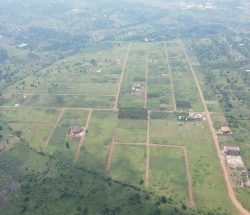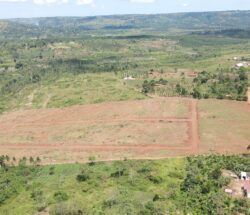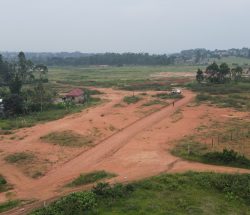Land Investment
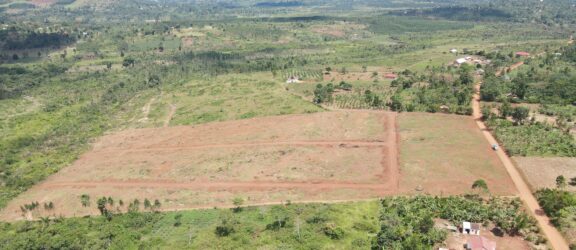
Green Estate offers cheap land in Mukono. Are you looking for cheap land in Mukono? Mukono is one of the fastest-developing districts in Uganda. Canaanites Limited has land in prime locations that offers quality living and livelihood. If you answered yes to any of these questions, then you need to check out Canaansites. We are therefore the top real estate developers in Uganda. What is Green Estate – Nkokonjeru? It is the one that offers cheap land in Mukono. Green Estate – Nkokonjeru This is the only estate offering cheap land in Mukono, so plan to book your plot. The estate is located in a developed neighborhood near Stella Maris Nsube school. The estate has on-site power thus convenience and comfortability. So, you should get a plot. The benefits of buying cheap land in Mukono? There is an opportunity to own a piece of land in a prime location that is close to amenities and facilities. Green Estate is ideal for relaxation and recreation therefore the client gets to enjoy a peaceful environment. You join a community of happy homeowners. They are successful and share your values and dreams. Customers are also guaranteed that their property’s value will go up. And this happens as the area develops. therefore It will go up over time. You get to support the local economy and contribute to the development of the region. You get to enjoy amenities like schools and hospitals in the neighborhood. Why Choose Canaansites Limited as Your Real Estate Partner? Canaanites Limited delivers quality public roads and real estate solutions in Uganda. Also, their portfolio of projects and testimonials from happy customers show their excellence. They also show their professionalism. Reasons for choosing Canaanites Limited as your real estate partner: We have a proven track record. The company also delivers quality public roads and real estate in Uganda. We aim to build public infrastructure. The company also provides real-estate development services in Uganda. We uphold core values. These are integrity, reliability, and innovation. We also offer many real estate products and services. These include planned and organized real estate for quality living and livelihood. Industrial lands, road construction, shell houses, construction services, and plots of land. The company offers a team of qualified professionals. They are ready to assist you with your real estate needs. They do so because they prioritize expertise and customer satisfaction. Canaanites Limited puts customers first. Thus ensuring your happiness and satisfaction by selling cheap land. They sell land in Mukono and other areas around Kampala. Contact Canaansites Limited for bookings. Contact Canaansites Limited. You can call them at 0755 941 805. Email Inquiry: [email protected]. Ask to learn more about the land in Green Estate – Nkokonjeru. Visit Their Blog for more investment tips and updates. Their blog also gives more insights into their properties. Therefore take quick action and Buy land in Green Estate – Nkokonjeru. It is celebrated for good living and livelihood. The best way to get specific information is to contact them directly. You can do this via phone or email. They can tell you about, pricing, and any other details you may need

Why Real Estate is a Profitable Business Venture in Uganda The real estate industry in Uganda is currently experiencing an upward trend, with increasing demand for both residential and commercial properties. Property trends indicate a growing interest in mixed-use developments, particularly in urban areas, as buyers seek convenience and amenities within close proximity. Additionally, there is a rising demand for affordable housing, driven by the country’s rapid urbanization and population growth. The supply of properties has also been on the rise, with developers catering to the demand for modern, well-designed buildings. Foreign investment in the real estate sector has been a key driver of growth, with international developers and investors showing interest in Uganda’s market potential. Government policies aimed at promoting sustainable urban development and improving infrastructure have also contributed to the positive momentum in the real estate market. Overall, the real estate market in Uganda is dynamic and evolving, with urbanization, foreign investment, and government policies playing crucial roles in shaping its growth and development. As the country continues to urbanize and attract foreign investment, the real estate market is expected to remain buoyant, offering opportunities for both investors and property buyers. Benefits of Investing in Real Estate in Uganda When it comes to investing in real estate, Uganda offers a plethora of benefits for both local and foreign investors. With a growing economy, stable political environment, and increasing demand for housing and commercial properties, the real estate market in Uganda is ripe for investment opportunities. Whether you’re looking to diversify your investment portfolio or capitalize on the booming real estate market, Uganda presents an attractive and lucrative opportunity for investors in the real estate sector. 1. High rental income potential High rental income potential in rental properties is often determined by several key factors. First, a desirable location plays a significant role in maximizing rental income. Properties located in safe, sought-after areas with good schools, access to public transport, and proximity to amenities tend to command higher rental rates. Second, property amenities such as modern appliances, in-unit laundry, dedicated parking, and outdoor space can also contribute to the attractiveness of the property, allowing landlords to charge higher rents. Furthermore, market demand is crucial in determining rental income potential. Properties in high-demand areas with low vacancy rates will likely attract more tenants, allowing landlords to set competitive rental rates and ensure consistent rental income. By leveraging these factors, landlords can maximize rental income and attract long-term tenants. Long-term tenants are crucial for stable cash flow, reduced turnover costs, and enhanced property maintenance. Tenants are more likely to stay long-term in properties with desirable locations, valuable amenities, and high market demand, ensuring a steady rental income stream for landlords. 2. Diversification and stability Diversification is a strategy that can contribute to stability in a business’s portfolio by spreading out risk across a variety of investments, products, or services. By not putting all of their eggs in one basket, businesses can reduce their exposure to the potential negative impact of market fluctuations and industry-specific risks. A balanced and diversified portfolio is crucial for managing risk and maintaining stability, especially in unpredictable market conditions. For example, if one area of the business is negatively affected by market fluctuations or industry-specific risks, other areas that are performing well can help offset those losses. This can help the business weather economic downturns or other unforeseen events without suffering substantial financial setbacks. In essence, diversification helps to mitigate the impact of market fluctuations and industry-specific risks by spreading out risk across different investments, products, or services. By doing so, businesses can achieve a more stable and reliable portfolio, reducing the overall impact of any single negative event. Therefore, a well-diversified portfolio is an essential tool for risk management and long-term stability for business owners. 3. Long-term wealth creation Long-term wealth creation is achieved through the principles of compound interest, investment diversification, and strategic asset allocation. Compound interest allows for exponential growth of wealth over time, as the interest earned is reinvested to generate even more returns. Investment diversification reduces risk by spreading investments across various asset classes, such as stocks, real estate, bonds, and alternative assets. Strategic asset allocation involves creating a balanced portfolio that aligns with an individual’s financial goals, risk tolerance, and time horizon. Successful long-term wealth creation through real estate involves investing in properties that generate rental income and appreciate in value over time. Stocks offer the potential for substantial long-term growth through capital appreciation and dividends. Retirement accounts, such as 401(k)s and IRAs, provide tax-advantaged growth and compounding of investment returns over a person’s working years, leading to significant wealth accumulation by the time they retire. By harnessing the power of compound interest, practicing investment diversification, and implementing strategic asset allocation, individuals can effectively build wealth over the long term through real estate, stocks, and retirement accounts. Understanding the Real Estate Market in Uganda Uganda’s real estate market is a dynamic and rapidly growing sector that presents both opportunities and challenges for investors, developers, and buyers. Understanding the unique dynamics and factors at play in this market is crucial for making informed decisions and maximizing potential returns on investment. Whether you are a local investor looking to expand your portfolio or an international developer considering opportunities in Uganda, gaining a comprehensive understanding of the real estate market is essential for success. Current trends and developments In the industry, current trends and developments are focusing on various technological advancements, market shifts, and consumer preferences. Technological advancements, such as artificial intelligence, machine learning, and big data analytics, are transforming how businesses operate, from customer service to sales and marketing strategy. Market shifts are occurring as e-commerce continues to grow rapidly, increasing the demand for personalized shopping experiences and faster delivery options. In addition, consumer preferences are leaning towards sustainable ...

The Future of Real Estate in Uganda Whether a Ugandan citizen or not, real estate in Uganda in terms of owning a piece of land or property remains a dream until you think you are ready to buy one. Then you realize you have a million questions unanswered. So you begin questioning: What is the future of real estate in Uganda? What is the most profitable real estate investment? What is the least amount I can invest in real estate? Is investing in real estate in Uganda profitable? All of these questions are valid. You are on the right track. And who wouldn’t want to establish the worth of their investment? I would ask the same questions if I were you. You may know that your real estate profits depend on various variations. And that’s why you want to understand the future of real estate. That said, this article explores the state of real estate, trends, and implications in revolutionizing the real estate sector in Uganda. You will also discover a favorable plot for sale in Mukono, one of the fastest-growing regions in Uganda. Let’s get the details! The State of Real Estate in Uganda The real estate market in Uganda was booming until COVID 19 hit, painfully disrupting property owners, buyers, and buyers. The economy was shaken, and almost no hope for profits was left for real estate investors. The last quarter of 2022 proved otherwise, with the market reviving and retaking its roots. Currently, the real estate market in Uganda is spurring the curiosity of innumerable investors, as it presents multiple ways to turn land into high-profit developments. The residential market continues to top the list, with the market value estimated to be USD 305.9 Billion in 2023. That’s an insane difference compared to the commercial real estate market (USD 32.73 Billion). And there’s a wide range of developments that are contributing to the soaring market growth. So, what factors contribute to the market’s growth, and what are the implications? Factors Contributing to Real Estate Market Growth in Uganda [Trends+ Implications] As Uganda’s economy and urbanization continue to take shape, various trends have emerged, propelling the growth of the market. Let’s look at the top 10 real estate trends in Uganda and their implications in shaping the future market. 1. The demand for housing in urban areas Uganda is quickly recovering from the adverse effects of the pandemic, and the economy is stabilizing. Consequently, those who had moved to rural areas seeking cheaper housing and trying to cope with the rising cost of living are returning to the city centers. The growing population in Uganda also drives many people to move to the city for jobs and business opportunities. Following the economic revolution, Kampala and the surrounding districts, including Mukono and Wakiso, are experiencing a population rise. The implication Increasing demand for residential and commercial real estate Rising property values and rental rates Opportunities for investors and property developers 2. The rise of affordable housing initiatives The demand for cheap residential housing has been rising above the available properties. The Ugandan government is actively collaborating with the private sector players to provide affordable housing in Uganda in response to the shortage. Such initiatives have promoted the launch of projects such as the 40-unit Citadel Apartments in Mbuya through the National Social Security Funds (NSSF). Thanks to government support, affordable yet decent houses are also available in the Nansana and Bweyogerere regions. The implication Improved accessibility to housing for low and middle-income earners in Uganda Increasing real estate investment opportunities Underutilized land is finally being utilized 3. A growing focus on accessibility The government has invested in infrastructure development, including bridges, road networks, and public transportation systems. Some of the earlier inaccessible regions have now become investors’ dream properties. For instance, developing the Northern Bypass Kampala and the Entebbe Expressway have opened new real estate hubs such as Bwebajja and Kajjansi. The implication Ease of accessing previously under-served areas Increased property value and land appreciation Opportunities for multi-use plots of land in the sub-urban regions 4. Real estate digital marketing Technology is critical in Uganda’s real estate development, marketing, and transactions. Real estate professionals and buyers are embracing digital platforms, virtual tours, property listings, and online property transactions. Realtors can accurately and conveniently update available properties for sale online with videos and photos taken from different dimensions. Prospective investors can also view the listed properties from anywhere in the world and transact online. These digital platforms have improved the transparency, convenience, and efficiency of real estate investing The implication The elimination of multiple site visits Enhanced property visibility and broader market reach A growing demand for real estate development projects 5. The rise of short-term rentals and Airbnb As discussed earlier in one of our guides, short-term rentals and Airbnb are various ways to invest in real estate in Uganda. Uganda’s flourishing tourism sector fuels this trend as investors seek to provide accommodation for tourists. Regions such as Bwindi Impenetrable National Park, Queen Elizabeth National Park, and Jinja are fast developing, with the construction of Airbnb, vacation homes, and hotels. The implication Diversified real estate investment options and jobs Increased potential profits for investors Increased real estate market growth 6. A shift to sustainable and environmentally friendly real estate Real estate buyers and professionals are growing conscious of their environmental responsibility in development. This includes developments prioritizing waste reduction, energy efficiency, and sustainable construction practices. The adoption of green building designs and technologies is gaining prominence within Entebbe and select regions around Kampala. Besides, building committees in five districts, including Mukono, Arua, Entebbe, and Gulu, have been trained on green building as part of their capacity-building initiatives. The implication Reduced carbon emissions and energy-saving plans for property owners Potentially attracting ...
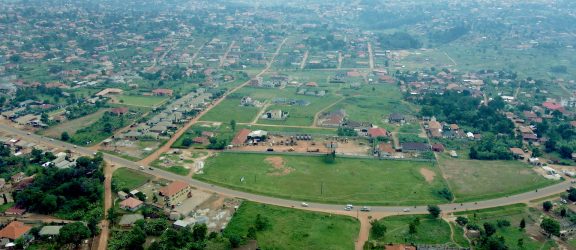
A Guide To Choosing Your Ideal Piece Of Land Are you one of the First Time Land Buyers in Uganda? And you have been dreaming of owning a plot in Uganda and believe you are ready to buy one? Congratulations! Becoming a landowner is a significant milestone. For most of us, if not all, it’s a dream come true. It’s an exciting venture, yet scary. But why? Identifying your ideal location, navigating the land acquisition procedures, and negotiating your deal can be overwhelming. And making sense of the vast amount of information on the internet can be confusing. The challenge is you want to buy the best plot. Yet you can’t tell what makes it the best. What if there was a better option? What if the land title is invalid? What if I face issues with the plot in future? Not to worry, this article discusses expert tips to help first-time land buyers in Uganda close the best deal. Let’s get started! 1. Research Your Desired Piece of Land Whether a Ugandan citizen or non-citizen, researching your piece of land is invaluable. This is where you explore and gather information about your ideal plot. But research isn’t research without a goal. And your goal can’t just be “finding out information about my piece of land.” So, here’s a guideline for conducting your research. #1 Identify the must-haves for your ideal plot You must devise a list of non-negotiable specifications for your dream plot. Ask yourself the following questions: Which location location would favor the development of my plot? Rural or urban? What should the environment around my plot look like? Think of security, amenities and development projects you may want to see around. How much land do I need? Consider future needs such as expansion of business that may require more space. What type of investment am I looking forward to? Do I need commercial, agricultural, or residential land? What is my budget? Factor in associated costs such as land title registration and transfer. #2 Research the specific land location in Uganda You have your land specifications. Now, it’s time to identify a favorable location. Here’s what to look for when researching the location of your plot in Uganda: How’s the infrastructure? Check how easily you can access roads, electricity, water, and internet services. What development plans are designated for the surrounding areas? The construction of roads and other development projects significantly influence your land use. What’s the neighborhood like? Consider the availability of the market, including businesses, colleges, etc., if you want to invest in rentals. #3 Research the real estate market in Uganda You don’t want to invest in land that takes years to yield profits. Try to understand the real estate market growth and projections. Here are the activities in researching the market for your plot: Compare prices of similar properties within the area you identified to determine a fair market value. Consider the market trends, such as economic growth, and how they affect your investment. Research the seller’s reputation. You can look for feedback from previous buyers or check online reviews. The quality of your research lays the foundation for your land-buying process. It acquaints you with the information you need before starting your venture. 2. Plan and Budget your Finances You need a financial plan and budget so you don’t fall prey to underestimation. Here are the expenses you should keep in mind when planning your finances: Land purchase cost: This is the cost of the land, which varies depending on size, location, and demand. On average, the cheapest land costs $2700/acre, which can go up to $135,000/acre. Legal fees: When verifying the land title, you must pay land registration and transfer expenses, including lawyers’ fees. The fee varies depending on the services involved and the land tenure system. Land taxes and rent: Ground rent and premiums are applicable when buying land on leasehold terms. Survey costs: You may need a surveyor to verify the size of the land. The survey also helps you mark clear land boundaries. Land development costs: What investments do you intend for the land? There are many ways to invest in real estate in Uganda. Whether investing in rentals or establishing a startup, plan for it. Because land buying is an investment, it doesn’t call for you to empty your accounts. Remember, land investments take time to accrue significant profits. Planning also helps you to think out of the box. You can consider loans and partnerships if your finances are insufficient. However, consider loans as your last option, and most preferably, only slate for land development costs. But why the development costs for loans? If your development plan is detailed enough, you know you know how much you should expect as profit and after how long you should expect it. Also, it is wise to get the plot first and look for ways of financing the development costs while the land appreciates. And you can also change your mind about the planned land use, which frees you to resell it at a profit. Or explore alternative options. 3. Work With the Experts in Real Estate if you are firs time Land Buyers In Uganda Whenever you are sick, you see the doctor. And so is land buying. As a first-time buyer, navigating the land acquisition process alone can be challenging. Even if you are successful, it may be more expensive than it would if you sought the help of an expert. Real estate experts include realtors and agents. Realtors are professionals licensed in buying and selling real estate assets. They can handle all processes from land search to acquiring a title certificate. Agents may not bear as much capacity as the realtors, but they are invaluable in locating your desired land. Why should you work with an expert? Here are ...
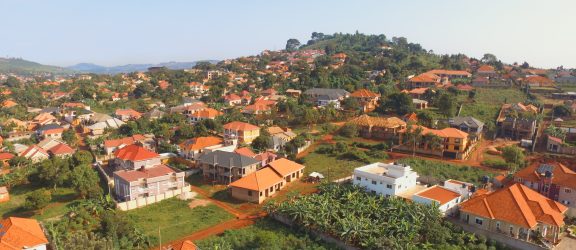
How to Invest In Real Estate In Uganda Uganda is currently (2023) politically unstable, with limited infrastructure and resources. However, these challenges merely hold the ground in determining your choice to invest in real estate in Uganda. The soaring demand for real estate investment opportunities in Uganda has gained traction from both citizens and non-citizens. The demand is one of the key contributing factors to the growing real estate market in Uganda, which is projected to record a CAGR of 5.23% between 2023 and 2028. Which opens an opportunity to consider investing in this field. And if you are wondering whether this is the right time to invest in real estate In Uganda, you have two reasons to base your decision on. According to TheAfricaInvestor, 2023 alone bears the potential to drive market growth by a 5.7% CAGR towards the end of the year. Additionally, Uganda’s economy is expected to skyrocket in the next five years, increasing by 29.4% (5.9 GDP). Besides, there are various lucrative real estate investment opportunities to grab, presented by the fast-growing economy. This article discusses the various ways to invest in real estate in Uganda and why you should consider it. You will also tap into available plots of land for sale in Uganda. Let’s dive in! 7 Ways to Invest In Real Estate In Uganda Many people ask, what is the most profitable real estate to invest in? Where can I invest to get returns? The truth is, Uganda’s real estate market is wide enough to accommodate everyone and help them reap their desired profits. So, if you want to invest in Uganda, here are the seven real estate investment opportunities to consider. 1. Buying Residential Property in Uganda Buying residential property is one of the most profitable investment opportunities in Uganda. Residential properties, including houses, condominiums, and apartments, offer opportunities for rental income and long-term economic growth. Uganda’s growing population and fast-paced economic growth have contributed to a rising demand for housing. Whether you buy a multi-unit apartment or a single-family home, you can earn a reliable source of income through rent payments. Furthermore, Uganda’s property is quickly appreciating, especially in the urban areas. Hence, you can buy and sell a property after a certain percentage of appreciation. Here are the considerations to keep in mind when buying residential property in Uganda: The location, location, location saying still holds: You want a property that rewards you with good profits. So, choose a property near shopping centers, schools and hospitals. Also, consider the availability of water, power, and good infrastructure. What’s your budget? Determining how much you are willing to invest is one way to prepare your funding. The maintenance cost and rental rates vary from condominiums to multi-unit apartments. Consider the property condition: A well-maintained property will quickly attract tenants and save maintenance costs. Who should manage your property? Decide whether you want to self-manage the property or hire a property management company, depending on your expertise and availability. Consider property laws and regulations: you don’t want to incur hidden expenses. Consider any regulations attached to your property so you can remain compliant. 2. Invest in Commercial Real Estate This is for you if you want to capitalize on Uganda’s economic growth and development. From office spaces to warehouses, commercial real estate offers a diverse range of advantages. Here are the significant types of commercial real estate: Office spaces: There is a growing demand for office spaces in major Ugandan cities such as Kampala, attracting organizations and businesses looking for suitable locations. Retail buildings: You can earn rental income from businesses and retailers from retail properties such as shopping centers and stores. Industrial properties and warehouses: Uganda’s logistics and industrial sector is fast growing. You can cater to businesses seeking storage and distribution facilities through warehouses and industrial properties. Generally, commercial real estate offers relatively higher profits than residential property for the following reasons: Higher rental income: You can count on a more consistent and substantial rental income as commercial properties command higher rental rates than residential properties. A diverse tenant base: You can have tenants from retailers, organizations and businesses, reducing the risk of vacant spaces month in and month out. More extended lease periods: The long durations of commercial leases offer greater stability by reducing tenant turnover rates. 3. Land Acquisition and Development in Uganda Land acquisition and development involves purchasing a plot of land and converting it into profitable ventures, including commercial and residential properties. Development opportunities include building property, investing in agriculture, or combining agriculture and property developments. Given Uganda’s soaring economic growth. Here are some of the reasons why land acquisition and development is a profitable venture: Higher appreciation rates: Infrastructure developments in Uganda are noticeable. Some underdeveloped regions are soon developing, attracting more businesses and investors. You can expect your property to appreciate, rewarding you with high profits. Besides, there are available plots for sale with developed infrastructure and neighborhoods, such as the Regency Estate near Nasuti Trading Center. Complete control over land use: You determine what works best for you, depending on the market research. You can tailor your land to meet your desired needs and goals. Here’s a quick guideline for obtaining land for development projects: Identify a suitable land location, preferably one with potential for economic growth. Plots near urban areas are some of the strategic locations. Conduct due diligence to verify the land’s ownership, including title certificate and legal status, to avoid future disputes or delayed projects. Assess the land location, size and the potential returns for intended developments to determine your profit margins. Develop a detailed development plan outlining the proposed project, design and development budget. Stay ahead of market trends to incorporate on-demand features, technology and designs if building a property. Here is what you should consider before buying land for development: ...
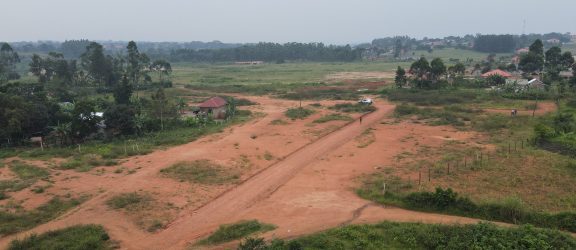
Complete Guide: How to Register and Transfer Land Title in Uganda – 10 Easy Steps Uganda’s Residential Real Estate market is valued at US$ 305.90 Billion in 2023. The value is projected to hit US$ 393.10 Billion in 2028, recording a 5.14% CAGR between 2023 and 2028. The growth indicates that there are as many properties as people are looking to buy and get a land title in Uganda fueled by several factors. Many people in Uganda are moving into the suburban areas in search of more housing space, the ability to work remotely, and lower living costs. There is also a growing interest in sustainable materials and energy-efficient homes with minimal environmental impact. Considering the market growth, buying a plot in Uganda, especially in the suburban areas, is a promising investment. And the process of buying a plot requires registration and transfer of land ownership. Transferring land ownership can be challenging, from gathering necessary documents to liaising with relevant government authorities and settling fees. This is why understanding the procedure of registering and transferring land titles in Uganda is vital. So, are you a prospective landowner or curious about possible investment opportunities in Uganda? This article looks into the procedure of registering and transferring land titles in Uganda. You will also learn the requirements, costs and challenges associated with the process. But before that, let’s understand who should apply for a land title certificate in Uganda. Who Can Apply for a Land Title in Uganda? Land titles are significant in validating the ownership of a plot. Hence, anyone looking for a land entitlement in Uganda is eligible to apply for a land title certificate, including the following: Ugandan citizens buying a new plot on freehold or leasehold terms Non-citizens buying or leasing a piece of land in Uganda Government and public institutions registering land for healthcare facilities, infrastructure developments, government offices or schools. Corporate entities (local and foreign) establishing commercial ventures such as factories and offices Individuals and families seeking to register their customary land in rural areas. What is required to transfer land title in Uganda? Here are the requirements for applying for a land title transfer in Uganda: Duplicate Certificate of the Title to transfer A set of passport photographs (including initial landowner’s and new landowner’s) Embossed Transfer form and 2 Consent forms Payment receipts for stamp duty, registration and consent fees Note: Stamp duty is 1% of the land value, registration fee is 10,000 and consent fee is 10, 000 for individuals and 15,000 for companies. How to Register and Transfer Land Title in Uganda You just bought a piece of land in Uganda. So, what next? Here is a step-by-step guide to registering and transferring your plot in Uganda: #1 Initiate a search and consent form request The Ministry of Lands provides the consent form, allowing you to fill in the details of the parcel you intend to search and register. Consequently, the Registry offers a Bank Avice Form, which facilitates the financial transaction for your search. The Bank Advice Form also acts as the determinant of your tax requirements and execution of associated payments. #2 Settle the search fee With the Bank Advice Form, you can pay your search fee at the bank. Upon payment, you should reserve the transaction receipts as you must present them at the Registry for your search to be executed. #3 Progress with the search and draft a transfer agreement The Ministry of Land is responsible for conducting the search. Once done, you can obtain a consent form for the title transfer. Additionally, it’s best practice to draft a transfer agreement with a lawyer at this point. It helps streamline the transfer process and saves you from any issues arising in the future. #4 Evaluate the value of your parcel The Chief Government Valuer is responsible for evaluating the value of your land. By determining the property’s value, you can calculate the Stamp fee, usually 1% of the property value. #5 Obtain a clearance form and the Stamp duty assessment Once the property value is approved, the documentation is forwarded to the URA desk, and you are issued with an assessment form for Stamp duty. If your land value exceeds 50 Million(UGX), you are required to provide a tax clearance form indicating the source of your income for tax compliance. Besides, the Tax Identification Number (TIN) is required for all land transfers involving Ugandan citizens. #6 Pay the Stamp duty Payment of the Stamp fee is exclusively made at the designated commercial bank. Following your payment, the bank informs URA of the completion of your transaction. A mandatory 3-working-day reconciliation is then conducted between the bank and the Uganda Revenue Authority. #7 Approval of land transfer by Kampala Land Board After the reconciliation between the tax authority and the bank, your transfer documentation is submitted to Kampala Land Board for approval. The receipts for the payment of consent forms are also required. If your land transfer involves a corporate entity, you need special authorization from the Land Board, which costs sh. 20000. #8 Assessing registration fees Your sales agreement is sent to Kampala Capital City Authority to confirm the registration fee. Additionally, you are provided an assessment form with details to pay the registration fee. The documents required at this stage include a receipt confirming payment of the stamp duty, a sales agreement, and the company’s decision to buy and sell. #9 Verifying the land transfer at the Registry The transfer documents are stored at the Land Registry. They are then forwarded to the Registrar for formal processing of the transaction. Once processed, it is sent to the land registration commissioner for verification. #10 Approving the registry and transfer The registrar nullifies the initial landowner and replaces the entry with the new owner. Passport photos ...
